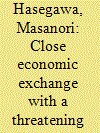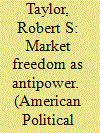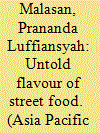|
|
|
Sort Order |
|
|
|
Items / Page
|
|
|
|
|
|
|
| Srl | Item |
| 1 |
ID:
160694


|
|
|
|
|
| Summary/Abstract |
China’s rise presents a daunting dilemma for many Asia-Pacific states. What has not been fully appreciated is that many of China’s neighbors confront the dilemma of “close economic exchange with a threatening state” (CEETS). If they continue CEETS, it strengthens the threatening state’s economic and military power, jeopardizing their security. However, ending CEETS can cause their own economies to decline, deteriorating their national power and destabilizing their governments. Dominant theories such as realism and liberalism have not adequately explained security problems caused by CEETS, its origins, and potential countermeasures against it. This article examines these issues, focusing on the Asia-Pacific. Although there is no single panacea against CEETS dilemma, a regional agreement such as the Trans-Pacific Partnership (TPP) could be a promising countermeasure against it.
|
|
|
|
|
|
|
|
|
|
|
|
|
|
|
|
| 2 |
ID:
128278


|
|
|
|
|
| Publication |
2014.
|
| Summary/Abstract |
Since the 1990s, inter-provincial female migration for marriage has become important in central and eastern rural China. Using survey data from X County in rural Anhui Province, we explore the arrangement of inter-provincial marriages, as well as the characteristics of husbands and wives, marital satisfaction and marital stability for these marriages. We find that inter-provincial marriage is an important option for local men to respond to the marriage squeeze and the increasing expense of marriage. It helps to relieve the shortage of marriageable women in the local marriage market. Because this kind of marriage is based on economic exchange, but not affection, it is often subject to a higher risk of marriage instability, and can lead to such illegal behaviors as marriage fraud and mercenary marriage.
|
|
|
|
|
|
|
|
|
|
|
|
|
|
|
|
| 3 |
ID:
127818


|
|
|
|
|
| Publication |
2013.
|
| Summary/Abstract |
Historically, republicans were of different minds about markets: some, such as Rousseau, reviled them, while others, like Adam Smith, praised them. The recent republican resurgence has revived this issue. Classical liberals such as Gerald Gaus contend that neorepublicanism is inherently hostile to markets, while neorepublicans like Richard Dagger and Philip Pettit reject this characterization-though with less enthusiasm than one might expect. I argue here that the right republican attitude toward competitive markets is celebratory rather than acquiescent and that republicanism demands such markets for the same reason it requires the rule of law: because both are essential institutions for protecting individuals from arbitrary interference. I reveal how competition restrains-and in the limit, even eradicates-market power and thereby helps us realize "market freedom," i.e., freedom as nondomination in the context of economic exchange. Finally, I show that such freedom necessitates "Anglo-Nordic" economic policies
|
|
|
|
|
|
|
|
|
|
|
|
|
|
|
|
| 4 |
ID:
085905


|
|
|
|
|
| Publication |
2008.
|
| Summary/Abstract |
Since the 1950s, Shangai has undergone major changes, reflected in the practice of urban planning, which has been influenced by different Western theories.Strategic and collaborative currents as well as the concept of sustainable developement have helped reformulate urban planning styles.Does this renewal mean the emergence of an original model of Chinese urban planning,notably with the concept of harmonious urbanisation?
|
|
|
|
|
|
|
|
|
|
|
|
|
|
|
|
| 5 |
ID:
164714


|
|
|
|
|
| Summary/Abstract |
The existing literature on street vendors has largely examined processes of marginalisation of informal enterprises amid rapid urban development. At the same time, the resistance methods of street vendors against the constraints of urban development have been extensively explored. However, these studies tend to focus on the binary position between informal and formal, as well as on the overt confrontation and conflicts between vendors and the state, which risks simplifying the heterogeneity of interests in the everyday practice of street vending. Delving into the daily work of street vendors in Bandung city, this article explores the everyday practice of traders in order to identify their subtle forms of resistance to removal and to the negative perceptions attached to them. By adopting the analytics of ‘people as infrastructure’ (Simone, 2004) and the idea of ‘building blocks of success’ for small enterprises (Turner, 2003), this article argues that social infrastructure is constituted and practiced through the construction of personal relationships and varied forms of informal economic exchange between vendors and their customers, informal organisers and neighbours, as well as through the adoption of new technology. Social infrastructures have become a means of building everyday politics for street vendors and a vital way of challenging the negative perception attached to street vending activities.
|
|
|
|
|
|
|
|
|
|
|
|
|
|
|
|
|
|
|
|
|